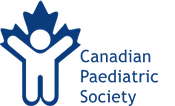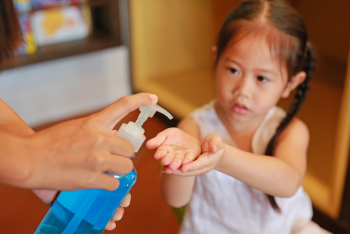Hand sanitizers: Promoting safe use by children
Posted on April 3, 2020 by the Canadian Paediatric Society | Permalink
Topic(s): Public education, COVID-19
By Dr. Geert ’t Jong, Dr. Nicole Le Saux, Dr. Michael J. Rieder
Because of the current COVID-19 pandemic, everyone is advised to wash their hands frequently or use an alcohol-based hand sanitizer.
Effective handwashing means scrubbing with soap and water for at least 20 seconds, then rinsing. This is especially important after bathroom use, before eating, after coughing, sneezing, or nose-blowing, and in settings where there is Clostridium difficile infection.
In health care settings, alcohol-based hand sanitizers are recommended after touching surfaces and before entering and leaving a patient environment, providing that your hands are not visibly soiled.
Outside the health care setting, hand sanitizers can be used the same way, as well as after sneezing or coughing.
Alcohol-based hand sanitizers should contain at least 60% alcohol. In Canada, these products are considered over-the-counter (OTC) drugs, and because of the COVID-19 pandemic, Heath Canada has allowed several unregulated products on the Canadian market.
Poison control centres in the United States have seen a recent increase in accidental ingestion of hand sanitizer, so adults must take care when these products are within reach of young children and when being used by children.
Advice to parents:
- When using hand sanitizer on yourself or others, apply a dime-sized amount to dry hands. Rub hands together until completely dry.
- Keep hand sanitizers out of reach of pets and children. Young children, especially toddlers, may be attracted by the pleasant smell and the brightly coloured bottles.
- Young children should only use hand sanitizer with adult supervision.
- Make sure children do not put any hand sanitizer into their mouth. Ingesting even a small amount of hand sanitizer can cause alcohol poisoning in children.
- If you suspect your child has ingested hand sanitizer, call a Poison Control Centre immediately. Do not wait for symptoms to develop.
- Watch to ensure children do not rub their eyes when their hands are wet with sanitizer.
- You don’t need to be concerned if your children eat with their hands or lick their hands after using hand sanitizer, as long as hands are dry.
Dr. ‘t Jong is chair of the Canadian Paediatric Society Drug Therapy and Hazardous Substances Committee; Dr. Le Saux is Chair of the CPS Infectious Diseases and Immunization Committee, and Dr. Rieder is past chair of the Drug Therapy and Hazardous Substances Committee.
Copyright
The Canadian Paediatric Society holds copyright on all information we publish on this blog. For complete details, read our Copyright Policy.
Disclaimer
The information on this blog should not be used as a substitute for medical care and advice. The views of blog writers do not necessarily represent the views of the Canadian Paediatric Society.
Last updated: Apr 20, 2020


